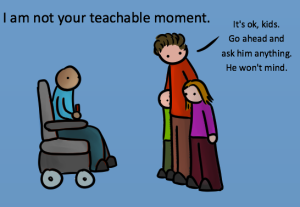
Source: BET
“Hey! I’m going to go have a drink with Steph, so I’ll see you around eight at your place?”
“I thought you were going to pick me up!”
“I said I might be able to pick you up. We never agreed to it.”
“So now you get to just blow me off, even though it’s raining and I have a bunch of stuff to carry.”
“Listen, you were the one who assumed I’d be available to pick you up…”
Pause.
Does this sound familiar?
I’ve had some variation on this argument thousands of times. Some minor misunderstanding leads to my being inconvenienced, which makes me grumpy.
It used to be that when something like this happened, the situation could escalate into something pretty nasty pretty quickly.
These days, these little skirmishes usually simmer down. What makes the difference between a blow-out and a short conflict is how I behave when I’m in a quarrel.
I was raised in a household where it was considered acceptable to be domineering, passive aggressive, or manipulative.
Often, the person who stayed maddest the longest would get their way, and frequently, my parents used their positions as authority figures to shut me up and shut me down.
As an adult, I’ve had to learn how to express frustration in a way that leads to positive – or at least neutral – outcomes.
Here are a few things I’ve learned that allow me to prevent arguments from escalating, to keep myself from saying things that I later regret, and to maintain a good relationship with the person I’m frustrated with or hurt by.
1. Remember You Care About This Person
You don’t want to hurt them, even if doing so would advance your point.
Don’t call them names, even if they seem accurate.
Don’t use condemning words like “lazy,” “scattered,” “neurotic,” and so on.
And don’t rub their nose in their flaws or shortcomings.
It’s hard when you’re angry not to exploit opportunities to hurt the person you’re arguing with. But it’s worth it to keep the tone as level as you can.
Barbs hurled during arguments don’t just make them worse – but also, the person that you hurl them at will remember that you’ve said them.
If you can avoid saying hurtful things (and you can!), you should.
2. Keep It to the Present Offense
It can be incredibly tempting to bring up past transgressions, especially if they are related. This is rarely a good idea.
If someone is repeatedly doing something that you don’t like, the way to address that is with a calm conversation.
But if someone hurt you, don’t bring it up every time that they do something related.
Stick to the fact that they hurt you and that you want them to apologize or not to do it again – or whatever it is that you’re looking for right now to feel validated.
This keeps scuffles from becoming a “he said, she said” situation.
No one keeps a perfect record of the past. Therefore, arguments can spiral downward into each person trying to accurately represent an intangible past pretty quickly.
If you really feel like there’s a pattern, try to bring it up when you aren’t angry.
3. Stay as Calm as Possible
Breathe in and out slowly.
Visualize kind things the person you’re frustrated with has said to you.
Before you begin an intense discussion (or, if you didn’t choose the timing, as the conversation is beginning), tell the other person that you may take a few seconds to answer because you will be trying to choose your words carefully.
It can be difficult to stay calm in a situation that is grating your nerves or otherwise hurting you, and it’s okay to be angry and for that anger to get the best of you sometimes.
But in order to work on these other suggestions, sometimes the best option is to stay calm.
4. Sort Through Your Feelings
Identify feelings of rejection and anxiety.
They may feel like something else, so practice asking yourself “Why do I feel this way?” and “What exactly is bothering me about this situation?”
Ask for reassurance if you need it.
Last week, I felt very anxious because I thought my girlfriend was beginning to spend less time with me, and I assumed that meant she liked me less.
Instead of lashing out, I told her I was feeling insecure and asked if we could think together about how to make me feel better.
It might sound dorky, but the outcome was my getting what I wanted, and our avoiding a fight.
Working through your own understanding of your feelings and then presenting them as such to someone else can be a healthy way to resolve conflict.
5. Become Familiar with Your Unproductive Habits
We all have go-to reactions when we’re frustrated or upset. They just might not always be the healthiest.
So practice overcoming or changing the ones that you think might be unproductive or unhealthy.
You can ask people with whom you argue frequently, like family or significant others, to tell you what these are, and what they’d like you to do instead.
It’s likely that they’ll react positively to your taking responsibility for bad behavior.
Remember, if you slip up, you can gently remind the person you’re in conflict with that you’re trying very hard to change.
hey may be able to be more patient with you if you show them that you’re taking changing your negative habits seriously.
6. Don’t Be Afraid to Apologize
And when you do, apologize for what you’ve done.
Sometimes I apologize even when I don’t think I’m “wrong.”
Because the truth is that I don’t have to have done something objectively wrong to hurt someone’s feelings. And sometimes it matters more to have a peaceful dinner or make someone feel heard than it is to be right.
I’m not saying that you have to let everything that bothers you go or that you should apologize just to shut someone up (seriously, don’t do this; it shows).
But sometimes it doesn’t really matter that this is the first time ever you’ve forgotten to take out the trash. You can just apologize for forgetting this week and prevent a whole world of hurt.
And remember to apologize for your own actions.
If you hurt someone, you hurt someone, whether you intended to or not. Use phrases like “I’m sorry I didn’t listen to your suggestions” rather than “I’m sorry your feelings were hurt.”
The latter sounds like a cop-out, even if you mean it sincerely.
Taking responsibility for that hurt doesn’t mean you’re admitting to being a bad person; it just means that you respect the other person enough to admit that you hurt them and to express regret even if your intentions were good.
After all, your impact matters more than your intent every single time.
***
Developing healthy argument habits is something that everyone can do.
Treating people with compassion and respect even when you’re angry at them is a cornerstone of building supportive relationships.
It may take some work, but in the end, everyone wins.
[do_widget id=”text-101″]
Wiley Reading is a Contributing Writer at Everyday Feminism. Wiley is a New Jersey-born artist, writer, environmentalist, and social justice advocate located in Burlington, VT. He works as a community health worker for the Greater Burlington YMCA, and writes for Disrupting Dinner Parties, a small collective feminist blog. In his free time, Wiley draws bugs and old buildings, loves every show on the Food Network, makes creative (read: pulled from the recycling) toys for his bunnies, and tipsily reminds every person in every bar that New Jersey is the best state. Follow him on Twitter @wreadinggo.
Search our 3000+ articles!
Read our articles about:
Our online racial justice training
Used by hundreds of universities, non-profits, and businesses.
Click to learn more




















